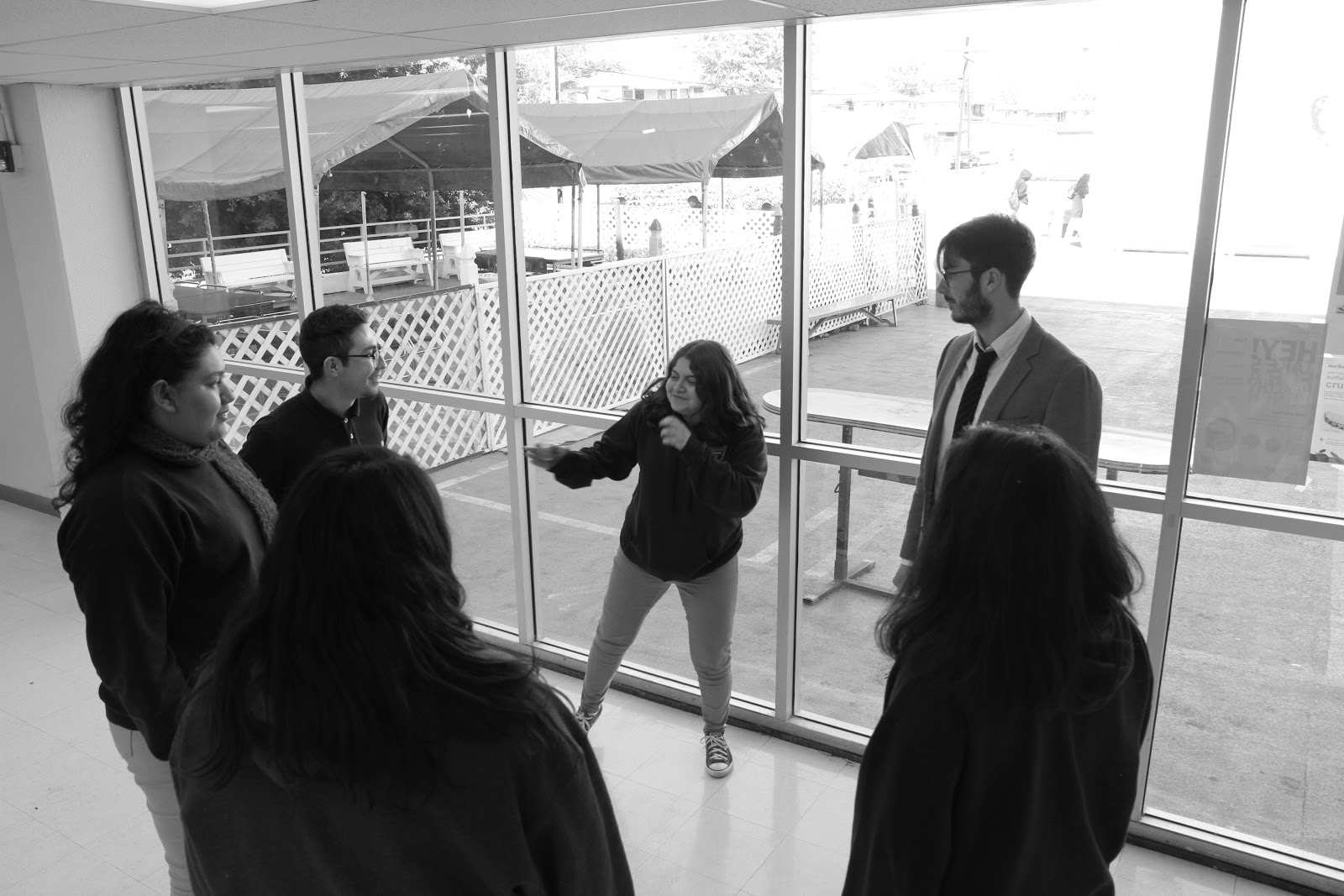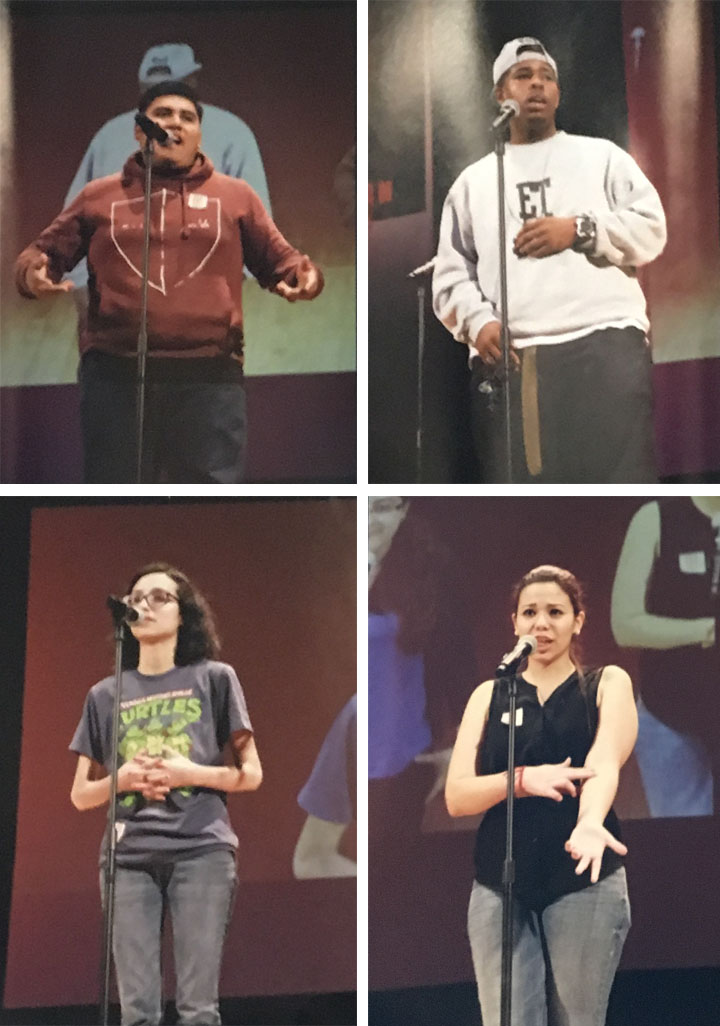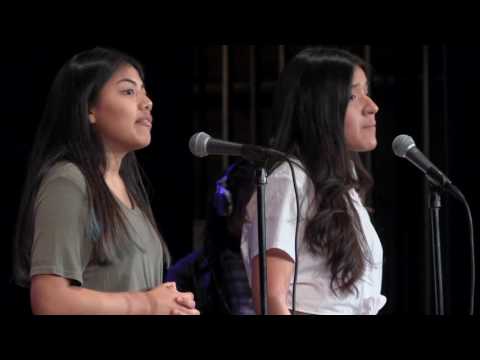Performance Poetry Teams Write a Legacy at Ánimo Inglewood

Since 2012, Ánimo Inglewood Charter High School has developed a steady stream of poets, planting roots in the teen poetry slam community. Students at Ánimo Inglewood have learned that poetry is more than a cluster of words thrown together by authors of yore, but rather it is a portal into the thoughts, feelings and stories of the poet. Moreover, the intense processes inherent to the craft of performance poetry contribute to the development of the leadership and life skills that are core to Green Dot Public Schools’ mission.
Ánimo Inglewood’s poetry curriculum and competition team began when they were invited to participate in Get Lit’s first annual Classic Slam in 2012. After implementing a poetry curriculum in drama class and hosting a school-wide performance poetry competition, students formed a team of five poets that competed against high school poetry slam teams across Los Angeles County.
In their first year participating, Ánimo Inglewood placed fourth of nearly 40 teams. Since then, a team of students from Ánimo Inglewood has continued to participate in each successive slam, making it to the finals four times in the past six years, each team adding to a legacy of future Ánimo Inglewood poets.
Exploring the Classics
Get Lit was founded by public speaker and writer Diane Luby Lane. Her experience touring college campuses with Chicano poet Jimmy Santiago Baca motivated Luby Lane to use spoken word and literature to change the lives of students.
Every April, which is National Poetry Month, high school students across Southern California prepare to compete at the Get Lit Regional Slam, the largest youth classic poetry festival in the world. Students research, study, and memorize a classic poem, and then write a personal response to the original. When students study and memorize classic poems, they gain a greater understanding of not only literature, but of themselves, as well as life outside their own communities.
While teachers may be required to teach the intricacies of poetry via state academic standards, creating space for students to dissect and respond to a poem allows the art form to become a tool of expression, empowerment and self-awareness for 21st century students. “Students have a lot of experiences in common, but often they don’t realize it, and there’s an amazing thing that happens in poetry,” said Will Ames, Ánimo Inglewood’s drama teacher and slam coach. “The struggles students may be dealing with come to the surface, allowing them to freely reveal their stories, and realize they’re not alone.”
“Being a part of the poetry slam team helped me open up and express my feelings in a way I never thought possible,” recalled John Jimenez, Ánimo Inglewood alumnus and former slam team poet.
Poetry had always felt unapproachable to Kimberly Delgado, another Ánimo Inglewood alumnus and former slam team member, until taking Ames’ class. “When you read poetry by Shakespeare or Robert Frost in an educational setting, you are unintentionally introduced to this selective idea of what qualifies as poetry. But the first time I saw slam poetry performed, I witnessed something that felt relevant and human to me.”
“The struggles students may be dealing with come to the surface, allowing them to freely reveal their stories, and realize they’re not alone.” – Will Ames, Ánimo Inglewood drama teacher and slam coach
By having students respond to poems from various eras, they create and participate in a conversation that spans generations. “It’s a powerful thing when students find a connection to a classic poet, be it William Butler Yates, Lucille Clifton, or Jimmy Santiago Baca,” said Ames. “Great poetry and fiction make us feel less alone in a way that TV and social media do not.”
Studying poetry allows students to tie the past to their present, providing them with a safe space to reflect on their experiences and feelings. “Often times when people are oppressed, things like poetry are the only form of release that they have. They carry messages that are ignored, but when documented, they will continue to exist regardless of time,” said Delgado.
Putting in the Work
At Ánimo Inglewood, Ames works with seniors to prepare their memorized classic and original response as part of a unit on performance poetry. He invites students to participate in a school-wide slam, the winners of which are invited to be on the school’s team that will compete at Get Lit’s Regional Slam.
Once the team is finalized, students spend several months polishing and perfecting their writing and their performances for the regional competition. For many students, this process proves to be both challenging and thought-provoking. Students recalled doing several rewrites of their works, each time gaining more depth and peeling back their own stories. For Delgado, it was one of most difficult things she ever had to do. “It was a journey of self-reflection, endurance, and friendship. We would write, and write, and edit again and again, each piece pushing us to go deeper,” recalled Delgado. “Mr. Ames would remind us, ‘we struggle to find words because nothing important ever comes easy’, and that is why it is meaningful.”

The writing and editing process pushes students to challenge themselves and own their truths. “At first students write stories they presume they’re expected to write, or stories they’ve seen in the media, and they try to fit that to their own life,” said Ames. “When you really push them to describe their own experience and use the tools of poetry, some really innovative and new stories emerge.”
A Lasting Impression

This “slam legacy” has had a lasting impact on students’ lives — it gives them a tool to creatively connect feelings, thoughts and the tangible world, to sharpen each other, and to strengthen their writing and public speaking skills. The opportunity to work on a team and build confidence by bearing original work in front of hundreds of peers reinforces their belief that their story matters — at Green Dot, we know it does.
Ánimo Inglewood slam team alumnus Stephanie Manjarrez remembers being shy in high school, so everyone was surprised when she joined the slam team. “Once I was in, I started to overcome my shyness and strengthen my confidence on stage,” explained Manjarrez. “The experience was extremely challenging, but because of it, I proved so many people wrong, even myself.”
Jimenez had a similar experience: “Poetry changed me — I began to think and act differently in school, to the point that I began getting better grades in my other classes, because I was so committed to being on the team, becoming a better poet, and a better version of myself.”



